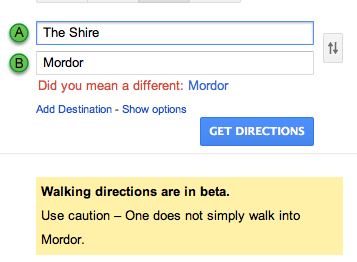Admit it. You’ve Googled yourself.
If I were to say that to my grandparents when they were alive, they would have called me crazy. Google used to mean a ‘1’ followed by a hundred zeroes. (It also was a book in 1913 about crazy creatures.)
But now people Google themselves to see what others are saying about them on the Internet. When I search ‘brian griggs’, this site is the first result, which is cool. The first YouTube video, though, is about a double homicide. Yeah, that’s not me. Hopefully people don’t assume it’s connected to me.
And that’s what Me on the Web, released today by Google, is all about. It’s a new feature for your Google dashboard that tracks all of your different online presences (Twitter, Facebook, LinkedIn, and whatever other social networks you belong to (a cupcake ning, perhaps?)) You can now see when people are looking at your online posts and even get notified when people mention you. Check out more here.
Now, Google doesn’t run the Internet, contrary to some students’ beliefs. When I ask them to cite their sources, they put down “Google”. Google is the search engine. It points you towards information. (Complicating this is all the stuff that Google does own, like Google Pages and YouTube.) If you find bad stuff about you online, Google can’t just go into someone’s site and remove the content. There is a URL removal request form that you can use to have Google take results out of a Google search, but if other sites have grabbed the unwanted stuff, it’s already too late.
At the start of the year, Google was ordered by the Spanish Data Protection Agency (AEPD) to take down outdated information from search results. The AEPD is calling it the Right to Forget. A man had been charged with a crime and was then acquitted, yet only the articles about him being accused of the crime came up in results. Google argued that their product only points to stuff and that it’s the responsibility of the content publishers to take down the unwanted data.
I write book reviews. Usually I stay pretty polite, since I understand that book enjoyment has a subjective element to it (and the whole “if you don’t have something nice to say” thing my mom always lectured me on). Also, books that I pick up to read will generally be worth a review. I’ve been in the business long enough to spot a completely blah book before I get too far in the book.
Let’s say that I have a huge criticism of a book in a review.
J. K. Rowling is going to make a huge announcement here. Let’s say it’s a book I don’t like and I wrote a review about how there are too many owls in the story and the whole thing is old hat. Rowling gets mad and asks Google to take away my search results. No matter what, I’m the one that put the information on the Internet and since I didn’t break any laws, it stays online. It just gets a little tougher to find if someone Googles it.
Me on the Web is a good tool to keep yourself informed about what other people are saying about you, if only to automate Googling yourself, but, like always, the key concept is to be careful because whatever goes online usually stays online in one form or another.



